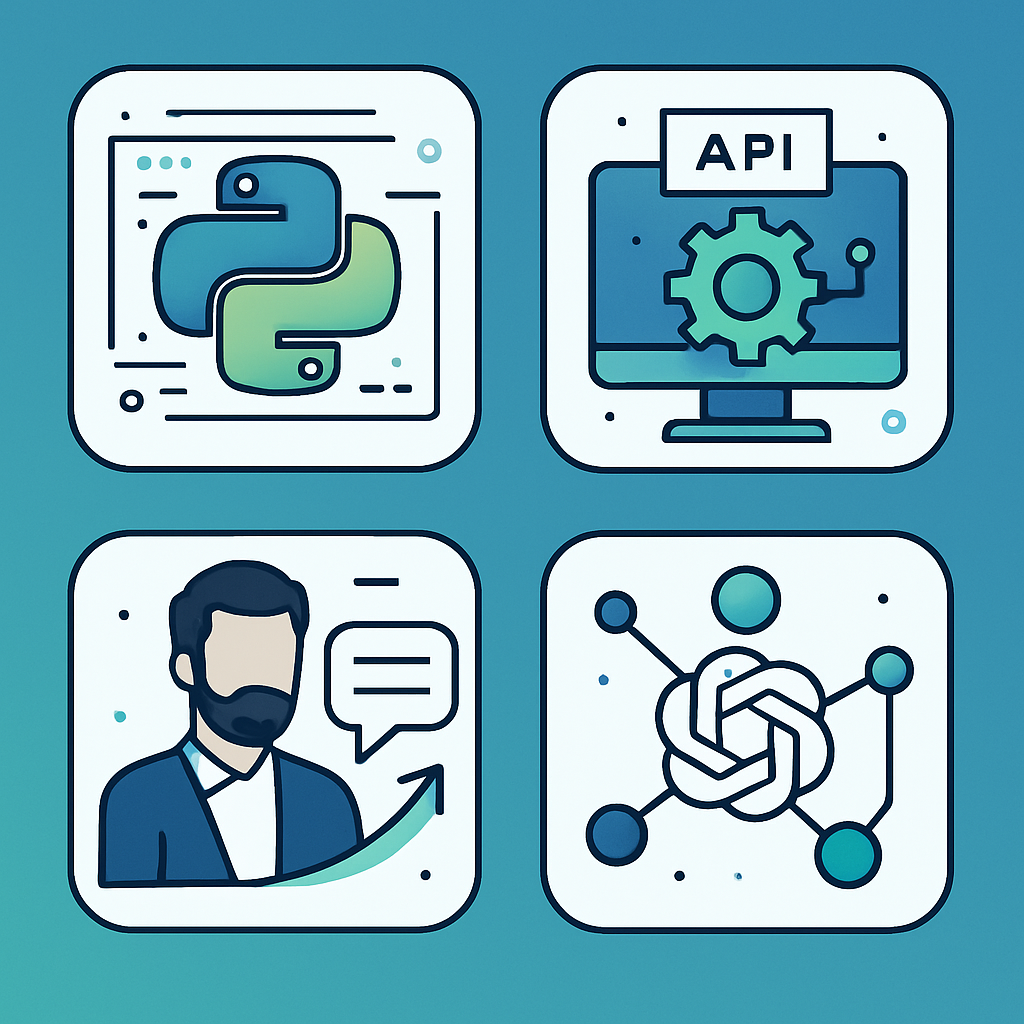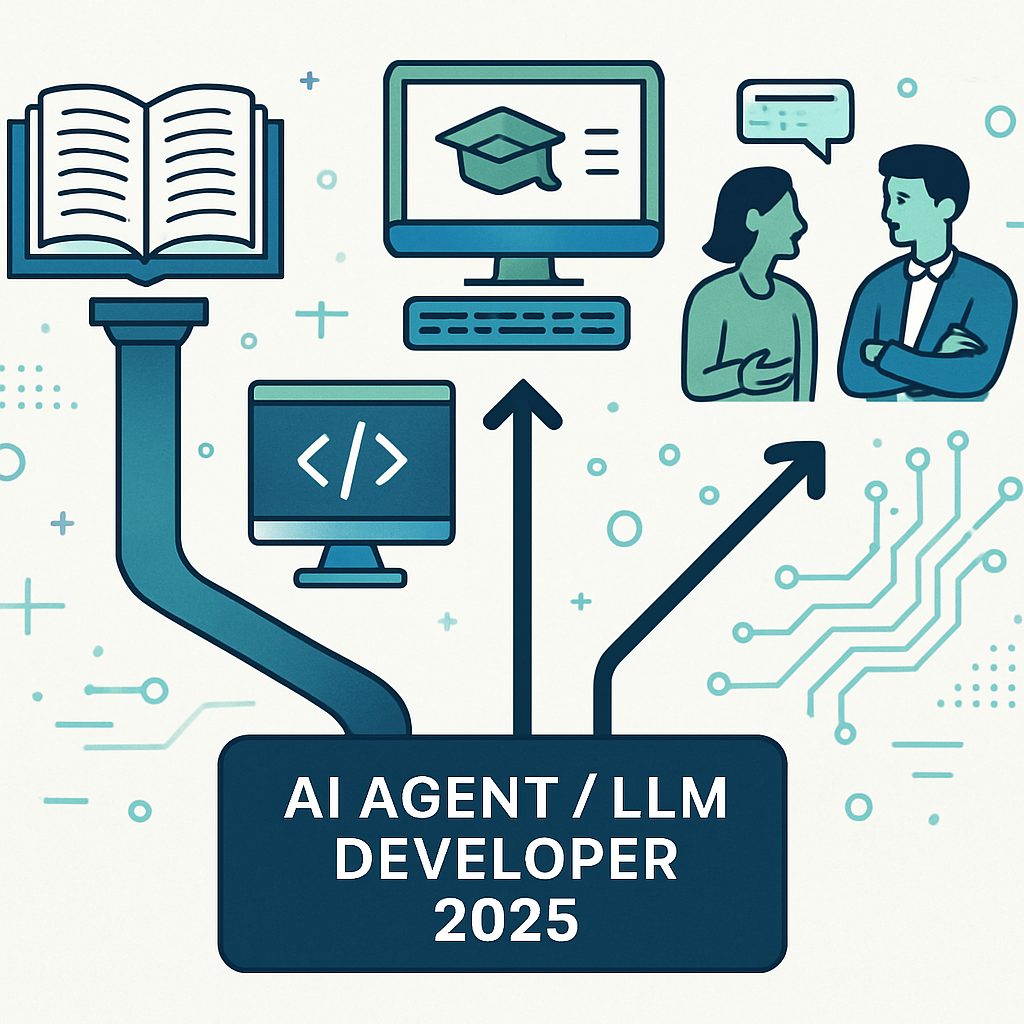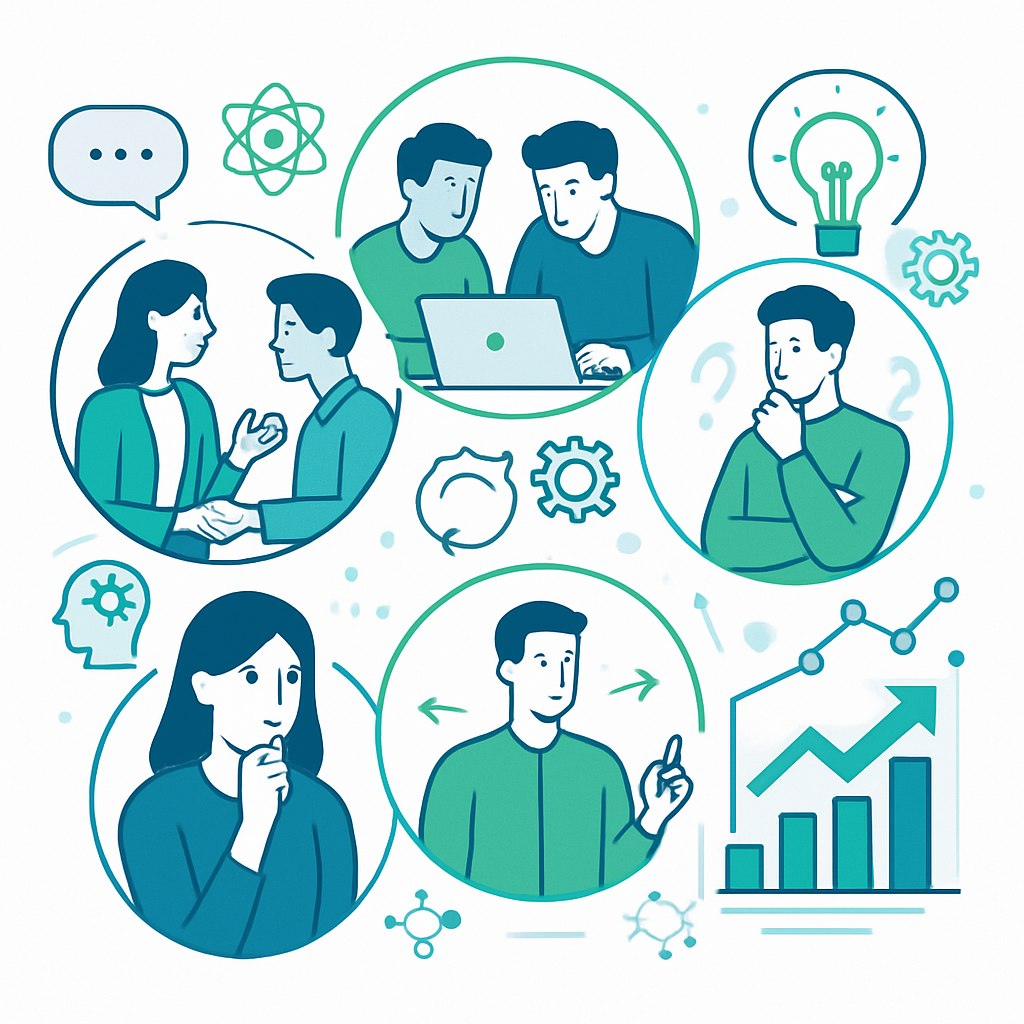Written by Manus AI – NOT ME
How to Become an AI Agent/LLM Developer in 2025
Hey there, tech enthusiasts! 👋
I’ve been diving deep into the AI world lately, and let me tell you – it’s absolutely wild how fast things are moving! Remember when we thought chatbots were impressive? Well, in 2025, we’re way beyond that. AI agents and LLMs have completely transformed from cool experiments to must-have business tools, and the demand for developers who can build these systems is through the roof.
I’ve spent the last few weeks chatting with senior devs and engineers from the big players – OpenAI, Google, Microsoft, Anthropic – and I’m excited to share everything I’ve learned about breaking into this red-hot field. So grab your favorite caffeinated beverage, and let’s dive in!
The AI Agent Revolution Is HERE

The evolution of AI agents from simple chatbots to complex autonomous systems (2020-2025)
Honestly, I’m still amazed at how quickly AI agents have evolved. These aren’t your basic chatbots anymore – we’re talking sophisticated systems that can make decisions on their own, reason through complex problems, and seamlessly work with all kinds of tools and platforms.
| Year | Key Developments | Industry Adoption | Notable Examples |
|---|---|---|---|
| 2020 | Basic chatbots and assistants | Early experimentation | Simple customer service bots |
| 2022 | Improved reasoning capabilities | Limited business applications | GitHub Copilot, ChatGPT |
| 2024 | Tool use and integration | Growing enterprise adoption | Microsoft Copilot, Claude |
| 2025 | Autonomous decision-making | Mainstream business adoption | OpenAI’s A-SWE, Anthropic’s agents |
I was reading about OpenAI’s Agentic Software Engineer (A-SWE) the other day, and their CFO Sarah Friar described it as capable of “building applications from scratch, automating tedious tasks, and acting as a force multiplier” for dev teams.
The stats from Microsoft’s Build 2025 conference blew my mind too – 46% of business leaders are already using AI agents for workflow automation, and a whopping 82% plan to adopt an “agentic workforce” within the next year or so. This isn’t just a Silicon Valley thing either. Anthropic’s engineering team mentioned they’ve worked with “dozens of teams building large language model agents across industries.” The revolution is happening everywhere!
Technical Skills You NEED to Have

Key technical skills for AI Agent/LLM developers in 2025
| Skill Category | Specific Skills | Importance | Industry Perspective |
|---|---|---|---|
| Programming | Python, JavaScript, API Integration | Essential | “Python remains the lingua franca of AI development” – Google Cloud |
| LLM Engineering | Prompt Engineering, RAG, Fine-tuning | Critical | “The difference between a mediocre prompt and a brilliant one can make or break your agent” – Anthropic |
| Architecture | Agent Design, Workflows, Orchestration | Very High | “Understanding when to use workflows vs. agents is essential” – Microsoft |
| Data & Infrastructure | Vector DBs, Cloud Deployment, Security | High | “Cloud costs can spiral quickly with these models” – OpenAI |
Python Is Still King 👑
No surprise here – Python continues to dominate the AI development scene in 2025. I loved how Simon Margolis from Google Cloud put it when talking about its importance for “data extraction, AI logic development, and web application integration.” While you might use other languages for specific tasks, Python’s ecosystem is just unbeatable for AI agent development.
AI and ML Knowledge (But You Don’t Need a PhD!)
While you don’t need to be a research scientist (phew!), you definitely need to understand how LLMs work:
| AI/ML Skill | What It Involves | Why It Matters |
|---|---|---|
| LLM Fundamentals | Understanding model capabilities, limitations, and differences | Helps select the right model for specific tasks |
| RAG Implementation | Building retrieval systems to enhance LLM accuracy | “Dramatically improves factual accuracy” – OpenAI |
| AI Agent Orchestration | Coordinating multiple specialized agents | Enables complex multi-step tasks |
| Testing & Evaluation | Benchmarking and measuring performance | Critical for reliable production systems |
Educational Paths to Get There

Multiple educational pathways to becoming an AI Agent/LLM developer
What I love about this field is that there’s no single “right” path – it’s super diverse!
| Educational Path | Key Components | Pros | Cons |
|---|---|---|---|
| Formal Education | CS degree, AI/ML specialization | Strong theoretical foundation, networking | Time-consuming, may lag behind industry |
| Self-Directed Learning | Online courses, open source contributions | Flexible, practical, up-to-date | Requires self-discipline, less structured |
| Industry Experience | Software development background, domain expertise | Real-world application, industry connections | May require career pivot |
| Hybrid Approach | Combining formal education with practical projects | Best of both worlds, most comprehensive | Time and resource intensive |
Self-Directed Learning Is CRUCIAL
The pace of innovation is insane, so formal education can only take you so far. I resonated with Google’s Simon Margolis when he talked about learning through building: “I like to start with a plan… build a prototype, and then completely rethink my approach.” That’s been my experience too!
| Learning Resource | What You’ll Learn | Best For |
|---|---|---|
| Company Documentation | Official APIs, best practices | Up-to-date technical details |
| Open Source Projects | Real-world implementation, collaboration | Practical experience, portfolio building |
| Hackathons | Rapid prototyping, networking | Building connections, testing ideas |
| Research Papers | Cutting-edge techniques, theoretical foundations | Deep understanding of underlying principles |
Soft Skills That Make the Difference

Essential soft skills for AI Agent/LLM developers in 2025
Technical skills alone won’t cut it in 2025! These soft skills have become just as important:
| Soft Skill Category | Specific Skills | Why It Matters | Industry Perspective |
|---|---|---|---|
| Communication | Cross-functional collaboration, technical writing | AI development requires working across disciplines | “The best AI agent developers can explain complex concepts to non-technical people” – Microsoft |
| Problem-solving | Systems thinking, ethical reasoning | AI agents require holistic understanding | “Workflows are systems where LLMs and tools are orchestrated through predefined code paths” – Anthropic |
| Adaptability | Continuous learning, comfort with ambiguity | Field evolves rapidly | “I’ve had to completely relearn certain aspects multiple times in the past year” – Google engineer |
| Business Acumen | Value proposition identification, domain expertise | Connects technical solutions to business needs | “The most impactful projects are those where I really understand the problem I’m solving” – OpenAI |
Ethical reasoning is becoming increasingly important as AI agents take on more responsibilities. OpenAI raises some thought-provoking questions: “Who is liable if an AI-generated solution fails critically, or if code contains inherent vulnerabilities?” I’ve been thinking about this a lot lately.
Breaking Into the Industry (Yes, You Can Do It!)
For newcomers to the field, here’s what I’ve found works best:
| Entry Strategy | How To Do It | Success Rate | Time Investment |
|---|---|---|---|
| Build a Portfolio | Create practical AI agent projects that showcase your skills | High | 3-6 months |
| Participate in Hackathons | Join events like Microsoft’s AI Agents Hackathon | Medium-High | 1-3 days per event |
| Contribute to Open Source | Work on Google and Microsoft’s agent frameworks | Medium | Ongoing |
| Specialize in a Domain | Combine AI expertise with knowledge in fields like healthcare or finance | Very High | 6-12 months |
Both Google and Microsoft maintain open-source agent frameworks that welcome contributions. This is how I got my start!
What’s Coming Next? My Predictions
Looking ahead, here are the trends I’m most excited about:
| Trend | Current State (2025) | Prediction for 2026-2027 | Career Opportunity |
|---|---|---|---|
| Multi-agent Systems | 43% of global leaders already using them | Will become the standard for enterprise AI | Agent orchestration specialists |
| Domain-Specific Agents | Early adoption in healthcare, finance | Explosion across all major industries | Industry-specific AI consultants |
| Autonomous Development | OpenAI’s A-SWE showing early promise | AI agents building and maintaining other AI systems | AI supervision engineers |
| Ethical & Regulatory Expertise | Growing concern as agents take on more responsibilities | Will become a mandatory aspect of AI development | AI ethics specialists |
OpenAI’s A-SWE points toward a future where AI agents participate in their own development. This feels like science fiction, but it’s happening now!
Final Thoughts
Becoming an AI agent/LLM developer in 2025 requires a mix of technical skills, continuous learning, and soft skills that enable effective collaboration. The field is evolving at warp speed, with new tools and techniques emerging almost weekly.
The most successful developers I’ve met are those who balance technical expertise with domain knowledge, ethical considerations, and business acumen. As OpenAI CEO Sam Altman predicted, 2025 is indeed the year AI agents “join the workforce” – and those who can build and manage these agents effectively will be at the forefront of this transformation.
Whether you’re a seasoned developer looking to pivot or a newcomer to the field, the opportunities have never been more exciting or accessible. My advice? Start building, keep learning, and engage with the community. The future is agentic, and it’s going to be amazing!
What do you think? Are you already working with AI agents, or are you looking to break into the field? Drop a comment below – I’d love to hear about your experiences!
This blog post is based on conversations I’ve had with senior developers and engineers at OpenAI, Google, Microsoft, Anthropic, and other industry leaders, plus my own experiences building AI agents in 2025.
Leave a Reply